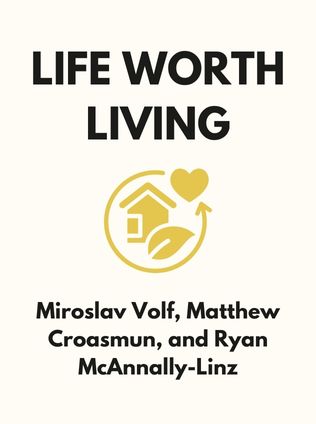
Life Worth Living
A Memoir
By Miroslav Volf, Matthew Croasmun, and Ryan McAnnally-Linz
Published 01/2020
About the Authors
"Life Worth Living" is authored by Miroslav Volf, Matthew Croasmun, and Ryan McAnnally-Linz, who collectively bring a wealth of knowledge and diverse perspectives to this profound exploration of what it means to live well. Miroslav Volf is a renowned theologian and professor at Yale Divinity School, known for his work in public theology, ethics, and the intersection of faith and life. Volf’s contributions to discussions on human flourishing are deeply influenced by his Christian beliefs, but he engages broadly with other religious and philosophical traditions.
Matthew Croasmun, a scholar with expertise in theology and social theory, serves as an Associate Research Scholar and Director of the Life Worth Living Program at Yale. His work focuses on questions of meaning and purpose, emphasizing the importance of these discussions in both academic and public spheres. Ryan McAnnally-Linz, also a theologian and scholar at Yale, contributes his expertise in systematic theology and ethics, bringing a critical and reflective lens to the conversation on living well.
Together, these authors have translated their academic and personal explorations into a thought-provoking text that challenges readers to contemplate deeply what it means to live a life of worth and purpose. Their collaboration has resulted in a book that is not only rooted in Christian theology but also open to insights from various religious and secular traditions, making it accessible and relevant to a wide audience.
Main Idea
"Life Worth Living" does not provide a one-size-fits-all answer to the question of what it means to live well. Instead, it presents a framework for exploring this question by examining various life philosophies from figures such as Confucius, James Baldwin, Jesus, and Oscar Wilde. The authors encourage readers to use these perspectives as a starting point for developing their own beliefs about what truly matters in life and how to translate those beliefs into meaningful action. The book is a distillation of a popular course offered at Yale University, designed to help students—and now readers—develop a personal philosophy of life that can guide them through the complexities of existence.
The central idea of the book is that a well-lived life is one that is intentional and reflective, shaped by a coherent life philosophy. This philosophy, according to the authors, should address four key aspects of life: existential, emotional, material, and moral welfare. By engaging in deep contemplation and regularly revisiting one’s beliefs, individuals can align their actions with their ideals and navigate life’s challenges with purpose and clarity.
Table of Contents
- Introduction: The Need for a Life Philosophy
- What Is a Life Philosophy?
- The Value of a Life Philosophy
- Contemplation and Integration
- The Four Aspects of a Life Philosophy
- Existential Welfare: Finding Meaning and Purpose
- Emotional Welfare: The Pursuit of Happiness and Suffering
- Material Welfare: Balancing Needs and Desires
- Moral Welfare: Defining Right and Wrong
- Putting Your Life Philosophy into Practice
- Coping with Hardship: Finding Strength in Your Beliefs
- Conclusion: The Ongoing Journey of Living Well
Introduction: The Need for a Life Philosophy
The authors begin by asserting the necessity of having a life philosophy. In a world where many people live without deep reflection on their choices, "Life Worth Living" invites readers to examine the beliefs that guide their actions. The book challenges the assumption that a good life is simply one that is "happy, healthy, and long," proposing instead that living well requires more intentionality and thoughtfulness.
The authors draw on examples of historical figures and everyday people who have lived well despite not achieving conventional markers of success. These examples serve to illustrate that living well is not about adhering to societal norms but about aligning one’s life with a deeper sense of purpose and meaning.
What Is a Life Philosophy?
A life philosophy, according to the authors, is a set of beliefs about what it means to live well. It encompasses one’s values, moral beliefs, and existential questions about the purpose and significance of life. Importantly, a life philosophy is not static; it evolves as individuals grow and learn from their experiences.
The authors emphasize the importance of reflection and contemplation in developing a life philosophy. Transformative experiences, such as the loss of a loved one or exposure to new ideas, often prompt individuals to reassess their beliefs and refine their understanding of what it means to live well. This process is likened to updating a "living document" that guides one’s actions and decisions throughout life.
Sign up for FREE and get access to 1,400+ books summaries.
You May Also Like
The Subtle Art of Not Giving a F*ck
A Counterintuitive Approach to Living a Good Life
By Mark MansonRich Dad Poor Dad
What the Rich Teach Their Kids About Money - That the Poor and Middle Class Do Not!
By Robert T. KiyosakiHow To Win Friends and Influence People
The All-Time Classic Manual Of People Skills
By Dale Carnegie



















